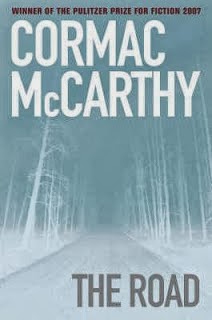I'm getting through A Clash of Kings far quicker than I anticipated, which is for the best considering I've got about thirty books sat in my wardrobe waiting to be read (including graphic novels). I'm about half way through that fantasy epic, brutal fantasy soap opera. In the meantime...
Cormac McCarthy
1996
"In those first years the roads were peopled with refugees shrouded
up in their clothing. Wearing masks and goggles, sitting in their rags
by the side of the road like ruined aviators. Their barrows heaped with
shoddy. Towing wagons or carts. Their eyes bright in their skulls.
Creedless shells of men tottering down the causeways like migrants in a
feverland. The frailty of everything revealed at last. Old and troubling
issues resolved into nothingness and night. The last instance of a
thing takes the class with it. Turns out the light and is gone. Look
around you. Ever is a long time. But the boy knew what he knew. That
ever is no time at all."
Though published almost six years ago to universal critical acclaim, I wasn't really aware of this book until very recently, entirely due to the fact I simply don't find myself attracted to contemporary fiction very often; nothing personal, it's just that I figure it's more likely to find a book that I'd really like among the hundreds and hundreds of older (and I'm just talking twenty years), already recognized classics than it is spending time on a modern novel that's yet to settle in the collective mindset of a truly great piece of work. Nonetheless, I'd heard people talking about this book on various forums and websites quite a lot, and once I saw it on the shelves for a very modest £3, new, I couldn't resist such a deal.
The Road was my introduction to Cormac McCarthy, very-well established Rhode Island-born author of such famous works as No Country for Old Men and Blood Meridian (one of the books sat waiting in my wardrobe) and I was very, very impressed; if not totally blown away then at least pushed a very great distance by gale-force winds. The Road's genre is one that, I've since discovered, has been debated with gusto regarding its sub-genre classification and ethical or deconstruct-able (yes I have made that word up) meaning, but at its undeniable plot-point basis is a post-apocalyptic thriller. An omniscient third person narration tells the gripping and harrowing story of one unnamed man and his young son traveling across a destroyed American landscape simply fighting for food and warmth. McCarthey crucially negates answering some of the biggest questions that the reader may have, choosing to leave them as mysteries to be pondered and debated on. Instead he merely shows us a world of death, where the sun fails to shine and the only life that remains is of a few struggling humans and creatures on a constant hunt for food. McCarthy tells us little about his two main characters either, simply giving a few details here and there throughout the book.
.JPG) It's perhaps this lack of detail that encapsulates the grip that The Road takes upon the reader. McCarthy's stark, immaculately composed prose reeks of the desperation and fear that he places on the father and son. The reader is given few hints as to what to expect except more fear, danger and desperation. We know that horrific gangs of desperate, cannibalistic men roam the landscape, abandoning every rule of civilization for the sake of survival. McCarthy describes desolate scenes of captivating apocalyptic surroundings that I found haunting and thrilling. Crucially, he fills every page with the concern and love of the father for his child, making his reader fear for the safety for the boy. Though his father is a very capable survival expert, his son shows glimpses of humanitarianism that he has long since lost, as the innocence of youth shines like a beacon.
It's perhaps this lack of detail that encapsulates the grip that The Road takes upon the reader. McCarthy's stark, immaculately composed prose reeks of the desperation and fear that he places on the father and son. The reader is given few hints as to what to expect except more fear, danger and desperation. We know that horrific gangs of desperate, cannibalistic men roam the landscape, abandoning every rule of civilization for the sake of survival. McCarthy describes desolate scenes of captivating apocalyptic surroundings that I found haunting and thrilling. Crucially, he fills every page with the concern and love of the father for his child, making his reader fear for the safety for the boy. Though his father is a very capable survival expert, his son shows glimpses of humanitarianism that he has long since lost, as the innocence of youth shines like a beacon.
The Road isn't a book based on plot-twists or an expected deus ex machina, but instead a bleak, unpredictable odyssey. There are very, very few supporting characters, none of whom exist for more than a few pages. Some passages are so extremely bleak it's hard to continue reading for the moment. There are a few moments of unequivocal, shocking horror. But despite all of this the love of parent and child jumps off the page as a major theme. While this book is so acclaimed partly because it's possible to read into it into so many different ways, it wouldn't be nearly as readable or successful if McCarthy didn't make you care about his two characters as people rather than extended plot devices. As a result it's completely possible to read The Road without having to think too hard about the extended ramifications, but simply as a nerve-wracking survival horror. However you choose to look at it, The Road is a stunning achievement. I have another author's bibliography to (slowly) explore.

No comments:
Post a Comment